Born during the first decade of this century, Fernando Lopes-Graça studied music with the best Portuguese masters of his time: the outstanding Fr. Tomás Borba, Luís de Freitas Branco and Viana da Mota. Besides others, these were members of a pleiad of remarkable musicians who, through their profound teaching reforms at the Conservatórios Nacionais (National Conservatories) and an acceptance of the progressive European flux of tendencies and aestheticisms, were also responsible for the renewal of music in Portugal, mainly: the dodecaphonism of the New Viennese School, the interrelationship of the arts; the introduction of musical technologies to Portugal; the diffusion of much past and contemporary national music; the systematic organisation of venues of European chamber music (in a country almost completely under the spell of the operatic repertoire), the promotion of national harmonies strongly related to folkloric origins, etc.
Since the 1930s Fernando Lopes Graça has been considered one of Portugal's most talented composers, playing a predominant role in the cultural Portuguese panorama through his activities as pianist, teacher, choral conductor, musicographer, writer, illustrator, translator and, fundamentally, author of a vast and diversified body of work in most fieds of musical creativity.
Besides those works exclusively recorded (mentioned in an appropriate paragraph) the following is a summary listing of some of his most important compositions:
• D. DUARDOS E FLÉRIDA -- a cantata,
• PARA UMA CRIANÇA QUE VAI NASCER (TO A CHILD TO BE BORN) -- for symphonic orchestra,
• QUATRO BOSQUEIOS (FOUR SKETCHES) -- for orchestra,
• GABRIELA CRAVO E CANELA--for orchestra,
• SETE PREDICAÇÕES DE OS LUSÍADAS (SEVEN PREDICATIONS ON THE LUSIADS) -- for string quartet,
• CATORZE ANOTAÇÕES (FOURTEEN ANNO-TATIONS) -- for string quartet,
• VINTE E QUATRO PRELÚDIOS (TWENTY-FOUR PRELUDES) -- for piano,
• AO FIO DOS ANOS E DAS HORAS (WITH THE PASSING OF YEARS AND HOURS) -- for piano,
• CANÇÕES HERÓICAS (HEROIC SONGS) --
• QUATRO REDONDILHAS DE CAMÕES (FOUR ROUNDELS BY CAMÕES) --for voices and piano,
• TRÊS LÍRICAS CASTELHANAS DE CAMÕES (THREE CASTILIAN LYRICS BY CAMÕES). --for voices and piano,
• QUATRO CANCIONES DE FEDERICO GARCIA LORCA (FOUR SONGS BY FEDERICO GARCIA LORCA) -- for voices and piano,
• 2 Concerts for Piano and Orchestra, and
• Numerous variations of Portuguese popular songs.
Born in Tomar (central Portugal), Fernando Lopes-Graça studied music in Lisbon. In 1931 he
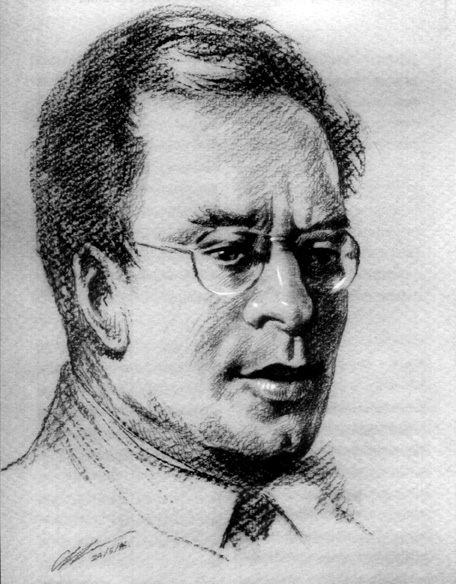 PREVIOUS PAGE:
Fernando Lopes-Graça.
LEI CHI NGOK李志岳 LI ZHIYUE
1996. Pencil on paper. 21.0 cm x 28.0 cm.
PREVIOUS PAGE:
Fernando Lopes-Graça.
LEI CHI NGOK李志岳 LI ZHIYUE
1996. Pencil on paper. 21.0 cm x 28.0 cm.
as classified first in the admission tests for teaching posts in the Conservatório Nacional de Lisboa (National Conservatory of Lisbon) but political reasons prevented him securing the admission. His political ideologies would strongly compromise his future career, eventually leading him to prison.
After long periods of residence in Coimbra and Paris, in 1939 he finally settled in Lisbon where he had, to the end of his life, a colourfulcareer, actively participating in all sectors of the capital's artistic, social and political life.
From his plurifaceted music production: dramatic, orchestral, concertant, choral-symphonic, chamber music, choral, a cappella, for piano, piano and voices, orchestra and voices, songs, balletic, etc., we see an incessant connection to the most important trends and tendencies developed since the beginning of the century -- from 'modalism' to 'atonalism', from Schönberg to Stravinsky -- with the research of a synthesis aiming at the expression of a language simultaneously universal and profoundly Portuguese.
In his adherence to an ecclecticism of influences, Lopes-Graça defined an artistic evolution with particular affinities to the personality of the Hungurian composer and traditionalist Bela Bartók (to whom he dedicated an "In Memorian", through his research methodologies and in the survey, register and analysis of the most varied 'colourings' of popular music, which he assimilated and restructured in his compositions with a personal talent and deep reflection, on the most specific and 'essential' melodic, rhythmic, tonal and harmonic variations, incomparable among the Portuguese composers of this century.
His folkloric inspirational sources, although present in a wide number of compositions, are most predominant in his piano pieces:
• VARIAÇÕES SOBRE UM TEMA POPULAR PORTUGUÊS (VARIATIONS ON A POPULAR PORTUGUESE THEME) -- for piano,
• MELODIAS RÚSTICAS PORTUGUESAS (RUSTIC PORTUGUESE MELODIES -- for piano,
• SUITE RÚSTICA N°2 (RUSTIC SUIT No. 2) -- chamber music,
• TRÊS DANÇAS PORTUGUESAS (THREE PORTUGUESE DANCES) -- for orchestra,
• VIAGENS NA MINHA TERRA (TRAVELS IN MY COUNTRY) -- for orchestra,
• NOVE CANÇÕES POPULARES PORTUGUESAS (NINE POPULAR PORTUGUESE SONGS) -- for voices and orchestra.
The 'national' amplitude of his lifelong contribution goes beyond the scope of his musical works. It is important to emphasise the close connections between Portuguese music and poetry which are aesthetical constants to all the corpus of the composer. These were implicit volitions of Lopes-Graça in a personal, dual attempt to render homage to both the most outstanding Portuguese literary authors and to the most creative works of past and present national language. Fernado Lopes-Graça put into music works by Gil Vicente(°1465-† ca 1536/37), Sá de Miranda (° ca 11481-†1558), Luís Vaz de Camões (° ca 1524-†1580), Manuel Maria Barbosa du Bocage (°1765-†1805), João Baptista da Silva Leitão de Almeida Garrett (°1799-†1854), António Augusto Soares de Passos (°1826-†1860), Antero de Quental (° 1842-†1891), Abílio Manuel Guerra Junqueiro (° 1850-†1923), António Nobre (°1867-†1900), Camilo Pessanha (°1867-†1926), Eugénio de Castro e Almeida (°1869-†1944), [Joaquim Pereira Teixeira de Vasconcelos] Teixeira de Pascoaes (°1877-†1952), [António Nogueira de Seabra Pessoa] Fernando Pessoa (°1888-†1935) António Tomaz Boto (°1900-†1966), José Gomes Ferreira (°1900-†1985), Miguel Torga (°1907-†1995), Joaquim Namorado (° 1914-†1986), Mário Dionísio de Assis Monteiro (°1916), João José de Melo C. Aires dos Campos Cochofel (° 1919-†1982), Sophia de Melo Breyner Andresen (°1919), Carlos Alberto Serra de Oliveira (°1921-†1981), Arquimedes da Silva Santos (°1921), and multiple poets published in the magazine "Presença" (Coimbra, March 1927 - Lisbon, February 1940) such as: [José Maria dos Reis Pereira] José Régio (° 1899-†1968), Carlos Queiróz (°1907-†1949), Adolfo Casais Monteiro (° 1908-†1972), and many more.
The up-dated recordings of Fernando Lopes-Graça offer at present the most representative works of his musical production. Because most of his record editions have been for long out of stock, the Secretaria de Estado da Cultura (The Secretariat for Culture) is currently reissuing in a systematic chronology integrated in its PORTUGALSOM collection, both in LP's and CD's, his most significant works.
The following titles are presently available:
• HISTÓRIA TRÁGI-CO-MARÍTIMA (TRAGICO-MARI-TIME HISTORY) --for choir, baritone and orchestra,
• VIAGENS NA MINHA TERRA: SUITE N°1 (TRAVELS ON MY COUN-TRY: No. 1 SUI-TE- for orchestra,
• VIAGENS NA MINHA TERRA: SUITE N°2 (TRAVELS ON MY COUN-TRY: No. 2 SUITE-- for orchestra,
• SINFONIETTA -- for string orchestra,
• REQUIEM -- for choir, soloists and orchestra,
• SONATA N°6 op. 221 (No .6 SONATA Opus 221) -- for piano,
• CINCO NOCTURNOS op. 105 (FIVE NOCTURNES Opus 105) --for piano,
• QUATRO IMPROVISOS op. 146 (FOUR IMPROVISATIONS Opus 146) -- for piano,
• DOIS IMPROVISOS op. 228 (TWO IMPROVI-SATIONS Opus 228) -- for piano,
• TRÊS SONETOS DE CAMÕES op. 27 (THREE SONNETS BY CAMÕES Opus 27) -- for voices and piano,
• AQUELA TRISTE E LEDA MADRUGADA op. 112 (THAT SAD AND MERRY MORNING Opus 112) -- for voices and piano,
• SEIS SONETOS DE CAMÕES op.215 (SIX SONNETS BY CAMÕES Opus 215) --for voices and piano,
• DEZ NOVOS SONETOS DE CAMÕES op. 231 (TEN NEW SONNETS BY CAMÕES Opus 231) --for voices and piano,
• CANTO DE AMOR E DE MORTE (SONG OF LOVE AND DEATH) -- for violeta (viola) and orchestra,
• QUARTETO N°2 (No. 2 QUARTET) -- for violeta (viola) and orchestra,
• CONCERTINO-- for violeta (viola) and orchestra,
• CONCERTINO -- for piano, strings, brass and percussion instruments,
• DIVERTIMENTO -- for timpani, violoncello, wind and percussion instruments,
• PRIMEIRA CANTA DE NATAL (FIRST CHRISTMAS CANTATA) -- for a capella mixed choir,
• SEGUNDA CANTATA DE NATAL (SECOND CHRISTMAS CANTATA) -- for a capella mixed choir,
• ONZE ENCOMENDAÇÕES DAS ALMAS (ELEVEN COMENDATIONS OF SOULS) -- for a capella mixed choir, and
• DOZE ENCOMENDAÇÕES DAS ALMAS (TWELVE COMENDATIONS OF SOULS) --for a capella mixed choir. □
Translated from the Portuguese by Rita Camacho
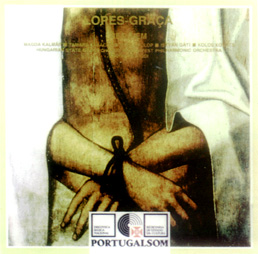
Record sleeve.
LOPES-GRAÇA.
DISCOTECA BÁSICA NACIONAL PORTUGALSOM SECRETARIA DE ESTADO DA CULTURA
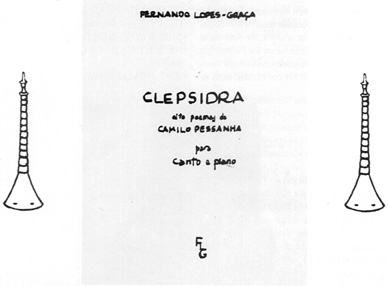
Suona蜍霰
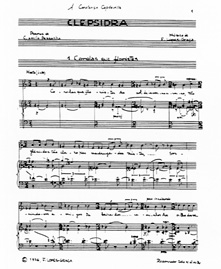
"Rosas de Inverno"
("Winter Roses")
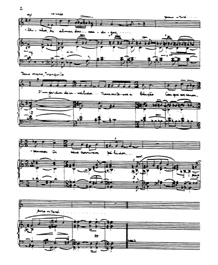
* MA in Germanic Philology by the Faculdade de Letras (Faculty of Arts) of the Universidade de Lisboa (University of Lisbon) and in Ciências Musicais (Musical Sciences) by the Universidade Nova de Lisboa (New University of Lisbon), both in Lisbon.
Director of the Conservatório de Macau (Macao Conservatory) and Lecturer at the Universidade de Macau (University of Macao), both in Macao.
start p. 109
end p.